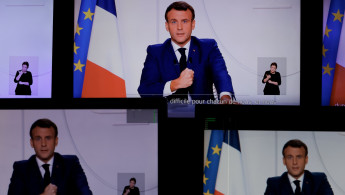French MPs approve contentious security law amid Islamophobia concerns
As MPs approved France's new security bill, the country remains engulfed in protest.
3 min read
Emmanuel Macron [Getty]
A controversial "global security" bill has been approved by the French National Assembly, France's lower house of parliament.
The draft law voted on Tuesday is meant to strengthen local police and provide greater protection to all officers.
It notably makes it a crime to publish images of officers with intent to cause them harm, a measure that has prompted repeated protests by civil liberties campaigners and media freedom groups.
Article 24 of the law would make it a crime punishable with a year in prison and a €45,000 fine to "publish, by any means and in any medium, the face or any other identifying feature" of a police officer or genderamie"with the aim of causing them physical or psychological harm".
Critics of the law like Jean Luc Melenchon, leader of France Unbowed said that the bill has a simple objective: "an authoritarian regime gets ready with the aim of controlling everyone, all the time, everywhere."
The vote was overshadowed by a violent police evacuation of migrants in central Paris Monday evening that drew nationwide attention.
France's Interior Minister Gerald Darmanin ordered an internal police investigation after officers were filmed tossing migrants out of tents while evacuating a Paris protest camp.
Darmanin acknowledged that some images of the evacuation were "shocking".
His rapid response stands in contrast to his vigorous defence of police officers in recent months, and to the government's tepid response to more severe violence by police at other protests.
Aid groups and the government were working to find temporary lodging for hundreds of migrants forcibly removed from the short-lived camp on the Place de la Republique in eastern Paris on Monday night.
Islamophobia concerns
The new bill has raised concerns by human rights organisations and critics of the French government, and as the bill seeks to clamp down on protests, doing so could curb demonstrations against Islamophobia.
Left-wing politicians accused Macron of paying favour to the far-right in an effort to shore up support for the 2022 presidential election.
"Emmanuel Macron presented himself as a bulwark against assaults on liberalism, but now he is leading the attack," Socialist party leader Olivier Faure was quoted as saying by Le Monde.
He added that Macron’s "solitary and opaque governance, and his desire to undermine the balance of powers by weakening the parliament, the press and the social partners [trade unions and employers] amount to a very worrying wrong turn for democracy".
Another law will go before French parliament next month counting what Macron said is "Islamist separatism".
There is also discussion of adding a provision that tracks school pupils from the age of three to ensure they do not drop out of the French education system prematurely in an effort eliminate unregistered schools for Muslim children.
The draft law voted on Tuesday is meant to strengthen local police and provide greater protection to all officers.
It notably makes it a crime to publish images of officers with intent to cause them harm, a measure that has prompted repeated protests by civil liberties campaigners and media freedom groups.
Article 24 of the law would make it a crime punishable with a year in prison and a €45,000 fine to "publish, by any means and in any medium, the face or any other identifying feature" of a police officer or genderamie"with the aim of causing them physical or psychological harm".
Critics of the law like Jean Luc Melenchon, leader of France Unbowed said that the bill has a simple objective: "an authoritarian regime gets ready with the aim of controlling everyone, all the time, everywhere."
The vote was overshadowed by a violent police evacuation of migrants in central Paris Monday evening that drew nationwide attention.
France's Interior Minister Gerald Darmanin ordered an internal police investigation after officers were filmed tossing migrants out of tents while evacuating a Paris protest camp.
Darmanin acknowledged that some images of the evacuation were "shocking".
|
His rapid response stands in contrast to his vigorous defence of police officers in recent months, and to the government's tepid response to more severe violence by police at other protests.
Aid groups and the government were working to find temporary lodging for hundreds of migrants forcibly removed from the short-lived camp on the Place de la Republique in eastern Paris on Monday night.
Islamophobia concerns
The new bill has raised concerns by human rights organisations and critics of the French government, and as the bill seeks to clamp down on protests, doing so could curb demonstrations against Islamophobia.
Left-wing politicians accused Macron of paying favour to the far-right in an effort to shore up support for the 2022 presidential election.
"Emmanuel Macron presented himself as a bulwark against assaults on liberalism, but now he is leading the attack," Socialist party leader Olivier Faure was quoted as saying by Le Monde.
He added that Macron’s "solitary and opaque governance, and his desire to undermine the balance of powers by weakening the parliament, the press and the social partners [trade unions and employers] amount to a very worrying wrong turn for democracy".
Another law will go before French parliament next month counting what Macron said is "Islamist separatism".
There is also discussion of adding a provision that tracks school pupils from the age of three to ensure they do not drop out of the French education system prematurely in an effort eliminate unregistered schools for Muslim children.





 Follow the Middle East's top stories in English at The New Arab on Google News
Follow the Middle East's top stories in English at The New Arab on Google News
![Netanyahu furiously denounced the ICC [Getty]](/sites/default/files/styles/image_330x185/public/2024-11/GettyImages-2169352575.jpg?h=199d8c1f&itok=-vRiruf5)
![Both Hamas and the Palestinian Authority welcomed the ICC arrest warrants [Getty]](/sites/default/files/styles/image_330x185/public/2024-11/GettyImages-2178351173.jpg?h=199d8c1f&itok=TV858iVg)
